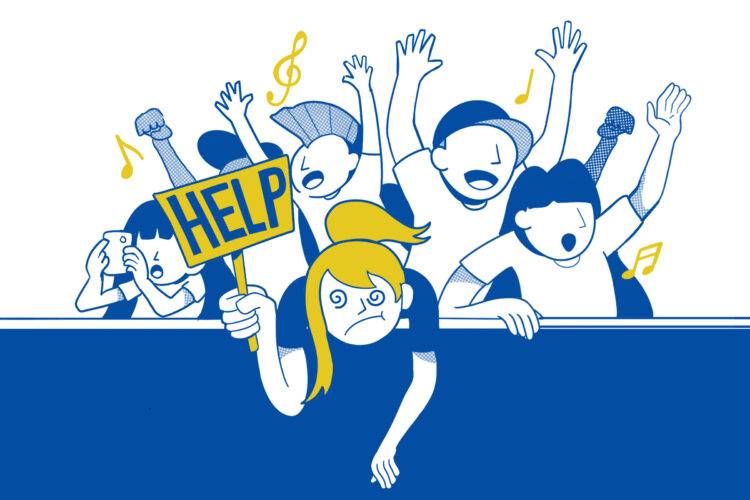
You spend the night going out with friends to see your favorite band perform at a local venue. You have an awesome time singing along, dancing, and taking way too many photos on your phone. It’s a great night!
But at what cost?
I’m not just talking about ticket prices. I mean the physical toll on the body.
As the blogger Eileen Davidson, who has chronic arthritis, writes in The Mighty, “The vicious cycle of chronic illness doesn’t care about your favorite band you have tickets to see or your own birthday party, two years in a row.”
Hangovers and sore throats aside, if you’re someone who lives with chronic pain, illness, and/or fatigue, a night out could mean debilitating flare-ups of your conditions that could last days or even weeks.
What makes concerts especially difficult for those of us living with chronic health conditions? Everyone’s bodies are different, so no singular answer will encompass everyone, but here are some of the key issues:
Some concerts involve standing for multiple hours, especially general admission concerts, as opposed to stadium or theater seating. And not only standing, but standing in a tightly packed crowd of people. It’s even more difficult for those with mobility aids that take up space, or for those with sensory issues.
You’re also not just standing for the concert. There’s an expectation that you will arrive early to the venue. Doors can open an hour or more before the first act goes on, then there are often multiple opening acts, meaning more hours before you see the headliner. All of this adds up to more time standing, but it’s unavoidable if you want a good spot.
The bathroom situation is especially onerous. Leaving your spot, unless you have a friend with you who stays behind, means forfeiting it. So if you need to use the restroom, you have to be okay with losing that spot you worked so hard to get.
Being in a crowd of people is also very warm, on top of venues themselves being warm. This can be overwhelming if you struggle with extreme temperatures.
Some concerts make “accessible tickets” available for sale, but these range in quality. It is often unclear in the ticket-buying process what an accessible ticket for a given venue or performance will actually get you. Many of the venues in Chicago fundamentally lack wheelchair accessibility. If you want to go to a concert in many of these venues, you have to call ahead to get someone to carry you and your wheelchair up the stairs. This is not accessible.
At the end of the day, concerts are exhausting, but that doesn’t mean they aren’t worthwhile. Going out and having a fun night can be meaningful, even if you know there’s potential for health flare-ups.
Internet support groups are a large space for connection within the disability community. There are many Reddit threads in disability support subreddits talking about concert-going, where contributors give each other advice.
“It’s selectively worth it for me. I have fibro, chronic fatigue, h-EDS, POTS (and other stuff). I will only choose the shows it’s worthwhile for me to feel wrecked after,” writes a user who goes by “DillyCat622” on Reddit.
“[The show I saw] made me feel alive. I loved it. I crashed for ages after. The pain was at a whole new level. Having never been to a rock concert before (been sick since I was too young), I didn’t realize how mentally exhausting it would be as well as the physical toll. I just couldn’t function. I can’t wait to do it again,” writes user who goes by “TheGreenPangolin” on Reddit.
Others have written about having to stop attending concerts completely as it takes too great a toll on their bodies.
But do concerts have to be this way?
Being wheelchair accessible, having clear explanations of what your accessible tickets are, and making sure that there are sight lines to the stage from your accessible seating should be the bare minimum — one that is not currently met by many venues. Accessibility should go beyond the bare minimum.
Theater provides some interesting alternatives to the problems of concerts. I’m an avid theater-goer, and the physical toll of seeing a play or a musical is much less than going to a concert.
Theaters usually have seating, a designated intermission for bathroom breaks, air conditioning, and the expectation is you arrive only 30 minutes early, so you have time to get to your often previously assigned seats.
I’m not saying that every punk venue should suddenly give up their mosh pits for polite theater seating, but there is merit in considering how some of the approaches to theater could make live music more accessible. Stadium concerts, for example, have the seating part down, but you also lose the intimacy that comes with smaller concerts.
The best concert-goer experience I’ve had in a long time was seeing Mitski live at the Auditorium Theater with one of my best friends. The Auditorium Theater is a large theatrical space, not your typical concert venue. We were very high up and far away from the stage, but in our theater seats, I could enjoy the show without worrying about how I would feel the next day.
Live music should be for everyone who wants to see it. There should be ways to enjoy it, up close and personal, while also having a spot to sit down.






